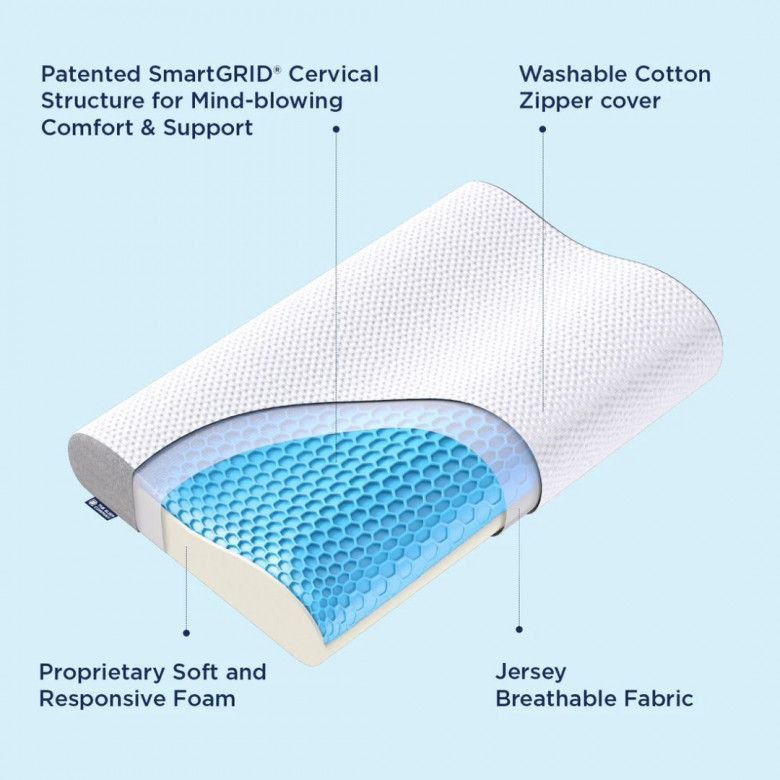views
Having a good night's sleep isn't only about resting for a certain number of hours—it's also about resting well while supporting your body in the process. If you find yourself waking up with a sore neck, tight shoulders, or stiff back, your pillow might be the problem. That's when orthopedic pillows step in. Made to provide your body's natural alignment, these pillows are specifically designed to take pressure off and enhance posture while sleeping. But not all orthopedic pillows are created equal and the best one for you largely depends on your sleeping position.
Whether you're a side, back, or stomach sleeper, here's how to choose the right orthopedic pillow to suit your needs and promote healthier, pain-free sleep.
Why Sleeping Position Matters
Your sleeping posture is what determines how your neck, shoulders, and spine are positioned while resting. An incorrect pillow—too firm, too loose, too tall, or inadequate support may strain joints and muscles, cause discomfort, or even create lasting posture problems.
Orthopedic pillows are intended to create the space between your body and mattress so that your spine is kept in the neutral position. But the "space" varies with the sleeping position. That's why choosing a pillow according to your sleeping position is so crucial.
Best Orthopedic Pillow for Side Sleepers
Side sleeping is one of the most prevalent and suggested positions for spinal wellness. It does, however, leave a big gap between your head and the mattress, which needs to be firm and high.
What to Look For:
Thick, firm pillow to cushion the head and align the neck with the spine.
Contour design that hugs the neck while easing shoulder pressure.
Knee pillows (optional) for between legs to maintain straight spine from hips to shoulders.

Recommended Features:
Cervical contour orthopedic pillows made of memory foam or SmartGRID material.
Adjustable height settings to accommodate varying shoulder widths.
Hypoallergenic and breathable materials for temperature regulation.
Side sleepers must not use flat or soft pillows, which make the head slump and distort the cervical spine, resulting in stiffness of the neck or shoulder pain.
Best Orthopedic Pillow for Back Sleepers
Back sleeping naturally supports spinal alignment, especially when the pillow safely cradles the neck. Yet, using an improper pillow can result in tilting the head forward, putting pressure on the neck and causing snoring or even sleep apnea.
Look For:
Medium-loft pillow that supports the natural curve of your neck.
Contour support that raises the neck slightly without forcing the head forward.
Optional wedge pillow to slightly raise upper body for improved breathing and acid reflux relief.
Recommended Features:
Memory foam or SmartGRID cervical pillows that mold to your neck contours.
Thin-to-medium height with ergonomic curves.
Built-in neck roll for additional cervical support.
Steer clear of overstuffed or overly firm pillows that elevate your head too high and collapse your neck's natural curve.
Best Orthopedic Pillow for Stomach Sleepers
Stomach sleeping is usually avoided by medical professionals, as it puts a strain on the spine and neck. But if it's the only position you can sleep in, selecting the correct pillow becomes even more important.
What to Look For:
Thin and soft pillow to reduce strain on the neck.
Low-profile design to maintain your spine as neutral as possible.
Optional body pillow to prevent lower back arching and facilitate side-sleep transition.
Recommended Features:
Ultra-soft memory foam or breathable latex with a flatter profile.
A pillow with pliable filling so you can shape it as desired.
Thin cervical pillows that don't push the head back.
Stomach sleepers should also work on training themselves to transition to side or back sleeping over time, particularly if there are chronic neck or back problems.
Specialty Orthopedic Pillows for All Sleepers
Besides position-specific options, there are specialty orthopedic pillows to support all sleeping styles:
Adjustable loft pillows: Allow you to add or subtract layers to get your ideal height.
Cooling orthopedic pillows: Perfect for warm sleepers, with gel or SmartGRID airflow layers.
Smart orthopedic pillows: With sensors or memory foam that adjusts to movement all night.
Pregnancy orthopedic pillows: These pillows are made to cradle belly, hips, and back for side-sleeping comfort during pregnancy.
How to Test Your Pillow
After choosing a pillow depending on your sleeping position, test it by reclining in your normal posture and checking:
Is your neck aligned with your spine?
Are your shoulders relaxed, not shoved forward or strained?
Is your head supported without tilting up or down?
Nearly every orthopedic pillow comes with a trial period take that time to check if it indeed alleviates pain and enhances quality sleep.
Last Thoughts
An orthopedic pillow is more than a fancy addition to the bed it's a must if you're in pursuit of pain-free, recuperative sleep. Buy orthopedic pillow that conforms to your sleep position, you align your spine, ease muscular tension, and enhance overall wellness.
Whether you're a dedicated side sleeper, a dedicated back sleeper, or wedded to a stomach-sleeping habit, the correct orthopedic pillow can be the difference. It's a small adjustment that results in improved posture, deeper sleep, and healthier mornings.






















Comments
0 comment